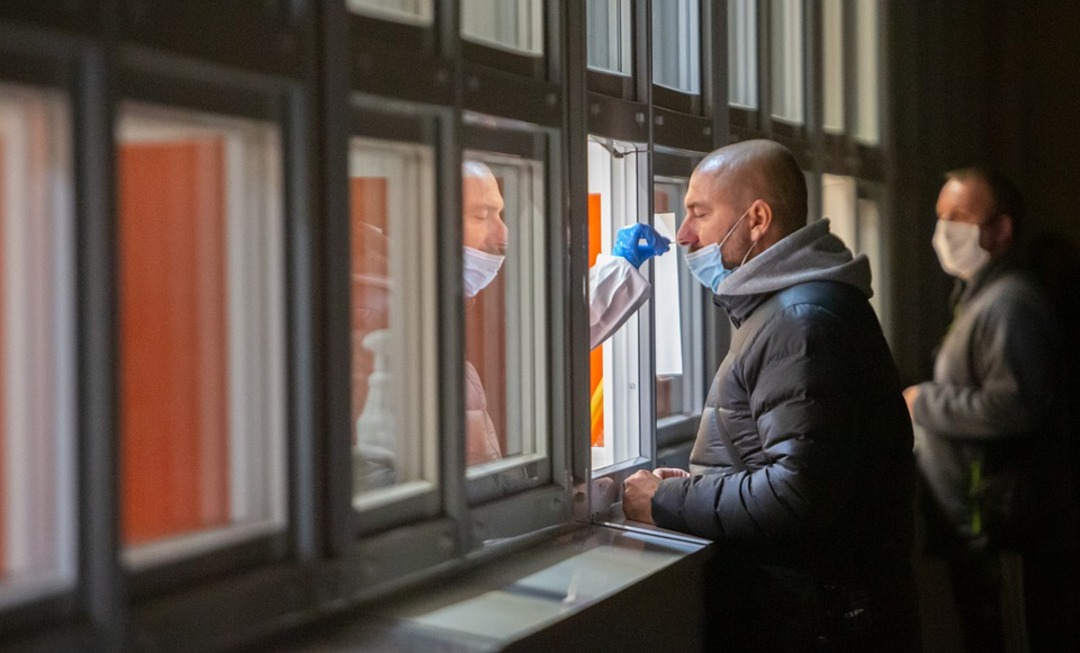-
Covid-19 fears 'may have led to 14% drop in live births' in Europe

Researchers said that Europe saw a 14% drop in the number of babies born in January 2021 compared to live births in the same month in previous years – likely sparked by fears of a Covid-19 health crisis during the first wave of the pandemic.
Scientists from Switzerland said countries with the toughest lockdowns in early 2020 and overcrowded intensive care units experienced the biggest drop in live births nine to 10 months later.
The team said these findings, published in the journal Human Reproduction, could lead to “long-term implications for demographics, particularly in western Europe where there is an aging population.”
dr Leo Pomar, midwifery sonographer at Lausanne University Hospital and associate professor at the School of Health Sciences in Lausanne, Switzerland – and first author of the study, said: “The drop in births nine months into the pandemic appears to be more common in countries where health systems were struggling and hospitals were overflowing.
“This led to lockdowns and social distancing measures to contain the pandemic.

“The longer the lockdowns lasted, the fewer pregnancies occurred during this period, even in countries that were not badly affected by the pandemic.
“We believe couples’ fears of a health and social crisis at the time of the first wave of Covid-19 contributed to a decline in live births nine months later.”
England and Wales saw live births fall by 13% in January 2021 compared to January 2018 and 2019 – while the number of babies born in Scotland fell by 14%.
Report: Two thirds of world’s countries failed to meet COVID-19 vaccine targets
Lithuania and Romania recorded the largest decreases in live births, at 28% and 23% respectively.
Sweden, which had no lockdown but had a high number of deaths, saw no drop in live births, the researchers found.
The team found that the length of lockdowns was the only factor associated with the decline in live births in January 2021 compared to January 2019 and January 2018.
dr Pomar said: “The link we found to the duration of lockdowns may reflect a much more complex phenomenon, as lockdowns are government decisions used as a last resort to contain a pandemic.
EU says Novavax COVID vaccine should carry heart side-effect warning
“The length of the lockdown has a direct impact on couples.”
While live births recovered, March 2021 was the only month with a live birth rate similar to the monthly rate before the pandemic, the researchers said.
However, they added that this recovery does not appear to offset the January 2021 drop in birth rates.
dr Pomar said: “The fact that the increase in births does not appear to offset the decline in January 2021 could have long-term implications for demographics, particularly in Western Europe where the population is aging.”
Covid cases and hospital admissions at 'highest level in months' in UK
Christian De Geyter, a professor at the University of Basel, Switzerland, who is deputy editor of Human Reproduction, said data on the impact of lockdowns on couples seeking fertility treatment is not yet available.
Prof De Geyter, who was not involved in the study, said: “These observations are important because they show that human reproductive behavior, as evidenced by the number of live births, changes during dramatic events, epidemics and global crises .”
Source: canadatoday
You May Also Like
Popular Posts
Caricature
BENEFIT AGM approves 10%...
- March 27, 2025
BENEFIT, the Kingdom’s innovator and leading company in Fintech and electronic financial transactions service, held its Annual General Meeting (AGM) at the company’s headquarters in the Seef District.
During the meeting, shareholders approved all items listed on the agenda, including the ratification of the minutes of the previous AGM held on 26 March 2024. The session reviewed and approved the Board’s Annual Report on the company’s activities and financial performance for the fiscal year ended 31 December 2024, and the shareholders expressed their satisfaction with the company’s operational and financial results during the reporting period.
The meeting also reviewed the Independent External Auditor’s Report on the company’s consolidated financial statements for the year ended 31 December 2024. Subsequently, the shareholders approved the audited financial statements for the fiscal year. Based on the Board’s recommendation, the shareholders approved the distribution of a cash dividend equivalent to 10% of the paid-up share capital.
Furthermore, the shareholders endorsed the allocation of a total amount of BD 172,500 as remuneration to the members of the Board for the year ended 31 December 2024, subject to prior clearance by related authorities.
The extension of the current composition of the Board was approved, which includes ten members and one CBB observer, for a further six-month term, expiring in September 2025, pending no objection from the CBB.
The meeting reviewed and approved the Corporate Governance Report for 2024, which affirmed the company’s full compliance with the corporate governance directives issued by the CBB and other applicable regulatory frameworks. The AGM absolved the Board Members of liability for any of their actions during the year ending on 31st December 2024, in accordance with the Commercial Companies Law.
In alignment with regulatory requirements, the session approved the reappointment of Ernst & Young (EY) as the company’s External Auditors for the fiscal year 2025, covering both the parent company and its subsidiaries—Sinnad and Bahrain FinTech Bay. The Board was authorised to determine the external auditors’ professional fees, subject to approval from the CBB, and the meeting concluded with a discussion of any additional issues as per Article (207) of the Commercial Companies Law.
Speaking on the company’s performance, Mr. Mohamed Al Bastaki, Chairman BENEFIT , stated: “In terms of the financial results for 2024, I am pleased to say that the year gone by has also been proved to be a success in delivering tangible results. Growth rate for 2024 was 19 per cent. Revenue for the year was BD 17 M (US$ 45.3 Million) and net profit was 2 Million ($ 5.3 Million).
Mr. Al Bastaki also announced that the Board had formally adopted a new three-year strategic roadmap to commence in 2025. The strategy encompasses a phased international expansion, optimisation of internal operations, enhanced revenue diversification, long-term sustainability initiatives, and the advancement of innovation and digital transformation initiatives across all service lines.
“I extend my sincere appreciation to the CBB for its continued support of BENEFIT and its pivotal role in fostering a stable and progressive regulatory environment for the Kingdom’s banking and financial sector—an environment that has significantly reinforced Bahrain’s standing as a leading financial hub in the region,” said Mr. Al Bastaki. “I would also like to thank our partner banks and valued customers for their trust, and our shareholders for their ongoing encouragement. The achievements of 2024 set a strong precedent, and I am confident they will serve as a foundation for yet another successful and impactful year ahead.”
Chief Executive of BENEFIT; Mr. Abdulwahed AlJanahi commented, “The year 2024 represented another pivotal chapter in BENEFIT ’s evolution. We achieved substantial progress in advancing our digital strategy across multiple sectors, while reinforcing our long-term commitment to the development of Bahrain’s financial services and payments landscape. Throughout the year, we remained firmly aligned with our objective of delivering measurable value to our shareholders, strategic partners, and customers. At the same time, we continued to play an active role in enabling Bahrain’s digital economy by introducing innovative solutions and service enhancements that directly address market needs and future opportunities.”
Mr. AlJanahi affirmed that BENEFIT has successfully developed a robust and well-integrated payment network that connects individuals and businesses across Bahrain, accelerating the adoption of emerging technologies in the banking and financial services sector and reinforcing Bahrain’s position as a growing fintech hub, and added, “Our achievements of the past year reflect a long-term vision to establish a resilient electronic payment infrastructure that supports the Kingdom’s digital economy. Key developments in 2024 included the implementation of central authentication for open banking via BENEFIT Pay”
Mr. AlJanahi concluded by thanking the Board for its strategic direction, the company’s staff for their continued dedication, and the Central Bank of Bahrain, member banks, and shareholders for their valuable partnership and confidence in the company’s long-term vision.
opinion
Report
ads
Newsletter
Subscribe to our mailing list to get the new updates!





















